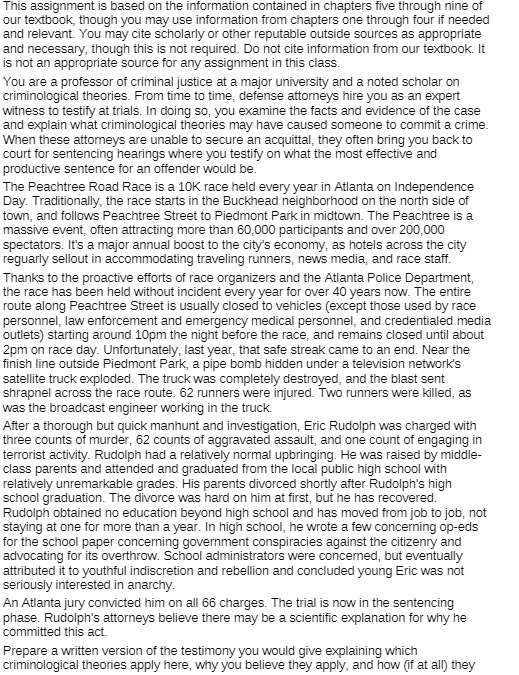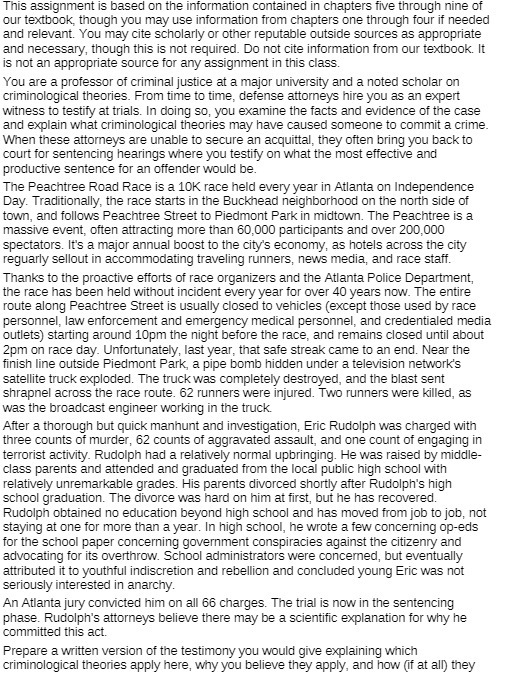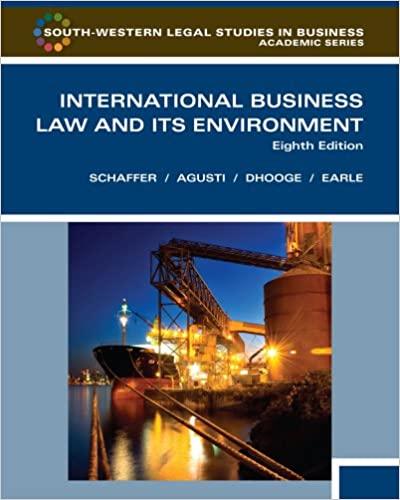
This assignment is based on the information contained in chapters five through nine of our textbook, though you may use information from chapters one through four if needed and relevant. You may cite scholarly or other reputable outside sources as appropriate and necessary, though this is not required. Do not cite information from our textbook. It is not an appropriate source for any assignment in this class. You are a professor of criminal justice at a major university and a noted scholar on criminological theories. From time to time, defense attorneys hire you as an expert witness to testify at trials. In doing so, you examine the facts and evidence of the case and explain what criminological theories may have caused someone to commit a crime. When these attorneys are unable to secure an acquittal, they often bring you back to court for sentencing hearings where you testify on what the most effective and productive sentence for an offender would be. The Peachtree Road Race is a 10K race held every year in Atlanta on Independence Day. Traditionally, the race starts in the Buckhead neighborhood on the north side of town, and follows Peachtree Street to Piedmont Park in midtown. The Peachtree is a massive event, often attracting more than 60,000 participants and over 200,000 spectators. It's a major annual boost to the city's economy, as hotels across the city reguarly sellout in accommodating traveling runners, news media, and race staff. Thanks to the proactive efforts of race organizers and the Atlanta Police Department, the race has been held without incident every year for over 40 years now. The entire route along Peachtree Street is usually closed to vehicles (except those used by race personnel, law enforcement and emergency medical personnel, and credentialed media outlets) starting around 10pm the night before the race, and remains closed until about 2pm on race day. Unfortunately, last year, that safe streak came to an end. Near the finish line outside Piedmont Park, a pipe bomb hidden under a television network's satellite truck exploded. The truck was completely destroyed, and the blast sent shrapnel across the race route. 62 runners were injured. Two runners were killed, as was the broadcast engineer working in the truck. After a thorough but quick manhunt and investigation, Eric Rudolph was charged with three counts of murder, 62 counts of aggravated assault, and one count of engaging in terrorist activity. Rudolph had a relatively normal upbringing. He was raised by middle- class parents and attended and graduated from the local public high school with relatively unremarkable grades. His parents divorced shortly after Rudolph's high school graduation. The divorce was hard on him at first, but he has recovered. Rudolph obtained no education beyond high school and has moved from job to job, not staying at one for more than a year. In high school, he wrote a few concerning op-eds for the school paper concerning government conspiracies against the citizenry and advocating for its overthrow. School administrators were concerned, but eventually attributed it to youthful indiscretion and rebellion and concluded young Eric was not seriously interested in anarchy. An Atlanta jury convicted him on all 66 charges. The trial is now in the sentencing phase. Rudolph's attorneys believe there may be a scientific explanation for why he committed this act. Prepare a written version of the testimony you would give explaining which criminological theories apply here, why you believe they apply, and how (if at all) they








